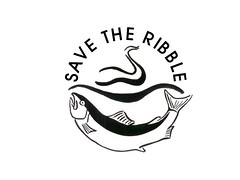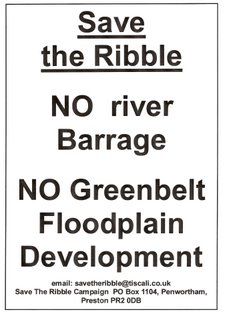Another Tidal Barrier proposal rears its irresponsible head - this time proposed for The Wash between Lincolnshire and Norfolk.
The Wash is a 620 km² (240 sq. mi.) biological Site of Special Scientific Interest, a Nature Conservation Review site, Grade I, a National Nature Reserve, an Internationally important Ramsar site, a Special Area of Conservation, and a Special Protection Area. It's in the Norfolk Coast Area of Outstanding Natural Beauty, and part of it is the Snettisham RSPB nature reserve. But somebody wants to build a barrage and huge waterside developments on it. Sound familiar?
The Wash is a stunning and ecologically important stretch of coastline between Lincolnshire and Norfolk. Photograph: Nature Picture Library/Alamy : The Guardian.
Readers of this blog will remember that The Wash and The Ribble Estuary are two of the most important habitats in the UK and beyond for migrating and breeding birds and other wildlife - indeed, important not even "just" in geographical Europe but to the entire Northern Hemisphere. The Wash is a huge area which encompasses a variety of coastal habitats including lagoons, tidal mudflats, shingle beach, and saltmarsh, providing refuge, and breeding and feeding sites, for vast numbers of wildfowl and migratory wading birds, fish nurseries, and seal colonies. As well as the small matter of offering a natural flood defence to numerous populated areas and huge swathes of farmland.
Tidal mudflats alone support more wildlife per square metre than tropical rainforest. Therefore, permanently flooding an intertidal ecosystem really is just like burning a rainforest to the ground.
The Norfolk Wildlife Trust believe this plan would be "catastrophic" for nature, they and a broad group of environmental experts, local businesses, and the £3.5m-per-year local fishing industry are:
"deeply concerned by the proposed new barrage development which threatens to cause catastrophic damage to one of Europe’s most important wetland habitats, turning it into a ‘green, fetid lake’. A tidal barrier on The Wash would release vast quantities of carbon into the atmosphere, exacerbating the impacts of climate change, which directly contradicts the claims of the developer, and could endanger lives by creating increased flood risk."
Readers of this blog will also remember that tidal barrages have huge economic as well as environmental consequences: Barrages and wetland ecosystems: the Environmental and Economic Impacts, and it is disappointing to once again see such an important habitat on a global scale under threat from such a seriously short-sighted and irresponsible scheme. A tidal barrage really isn't as "Green" as it might sound on the face of it!
Yes, we DO want to move away from fossil fuels but NOT at the expense of one of the most important and diverse habitats in the world. Amongst their many and extensive benefits to the global ecosystem, wetlands are also extremely important carbon storage systems.
One can't help but be cynical when you see that this proposed "renewable energy" scheme is yet another case of Greenwashing. The man behind the plan, Entrepreneur James Sutcliffe, who has managed and advised port companies in Sierra Leone and Bangladesh, actually wants the proposed project to be:
'a [container] port, powered by tidal energy, which Sutcliffe says would create electricity for 600,000 homes and businesses in the region [... and] create the potential for cruise-ship tourism and a new road that links Lincolnshire to Norfolk in 20 minutes. [Plus...] the calm waters created by the tidal barrier would provide opportunities for “marinas and construction of desirable waterside developments” as well as “safe sailing”, and [claims] that the construction would protect the local environment from flooding.'
Ah, so it's actually just a massive development scheme with a bit of greenwashing thrown in. Same old, same old. And no, it wouldn't protect the local environment from flooding. The saltmarsh and mudflats of The Wash itself already does just that.
You can read more below:
Labels: Birds, carbon storage, climate change, fish, flood defences, flood risk, RAMSAR, renewable energy, rspb, Special Protection Area, SSSI, Tidal barrage, wave and tidal energy, wetland ecosystem, Wildlife Trust















